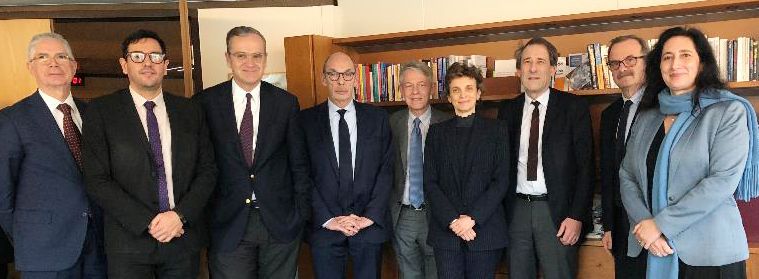After the closure of the 25th United Nations Climate Change Summit, the nine French regulators who met on Monday, 16 December 2019, in the offices of the Financial Markets Regulator (AMF), discussed taking the climate targets set out in the Paris Accord into account in their strategic guidelines and in their operational actions. The main conclusions they reached are as follows:
The urgency of climate change is a central issue for regulatory authorities
Achieving the targets of the Paris Accord requires radical and irreversible changes in all areas of economic activity, which will have far-reaching social and societal implications. These changes which are crucial to battling against global warming and enabling our economies to adapt – along with all of the resulting opportunities and risks – are central to the task of regulation. Regulators must be capable of undergirding these changes and educating the society that challenges them on these issues.
Authorities are leveraging their ability to take action and addressing shared issues: incentivising businesses, informing the public and fighting against greenwashing [1]
The Authorities have mandates that take climate objectives into account to varying degrees, and are thus already leveraging their ability to address the issues (building awareness and monitoring regulated players, defining incentivising rules and regulations…). Through data-drive regulation, regulators can also reduce information asymmetries, create positive incentives for businesses, and help public authorities and individuals in their decision-making by supplying them with facts on climate risk and the environmental impact of different activities.
Having a well informed public is another key issue. Although people are increasingly vocal in their support of climate change, their knowledge of overall problems and the outcomes of their actions (as consumers – or savers – of energy, goods and services…) is often limited. Consumers are nevertheless having to deal more and more with eco-friendliness being used a selling point. Educating and helping fight against greenwashing are thus operational priorities for regulators.
Regulators’ ability to respond to climate challenges will be strengthened by deepening their collaboration and sharing expertise
In many instances, climate issues are a new area of expertise for authorities. Which is why authorities decided to build a dialogue network, to pool their means and expertise. To formalise their discussions and provide an account of their progress in this area, the authorities will deliver their initial conclusions in a joint document, which will be published in the coming months.
A framework for regular dialogue and collaboration between authorities
The meeting on 16 December 2019 is part of the regular biannual meetings of the Chairs of independent administrative and public authorities that have been held since 2017, in addition to regular technical meetings on opportunities to work together. Two joint reflections have been published as a result, one on smart speakers and voice assistants (May 2019) and one on date-driven regulation (July 2019).
At the meeting on 16 December, the authorities also addressed the issue of regulating algorithms, following a joint report from the Competition Authority and its German counterpart, the Bundeskartellamt, and a case study carried out by French broadcasting authority, CSA, on a video recommendation algorithm used on the Internet.
This meeting also provided an opportunity to discuss best practices for regulators to adopt: codes of conduct for staff members who leave to work in the private sector, managing insider information from regulatory activities concerning listed companies and which could affect financial markets.
The authorities participating in this initiative are AMF, the Competition Authority, Arcep, ARJEL, ART, CNIL, CRE, CSA and HADOPI.
[1] Greenwashing refers to the misleading use of eco-friendliness as a selling point or for reputation-building purposes.

